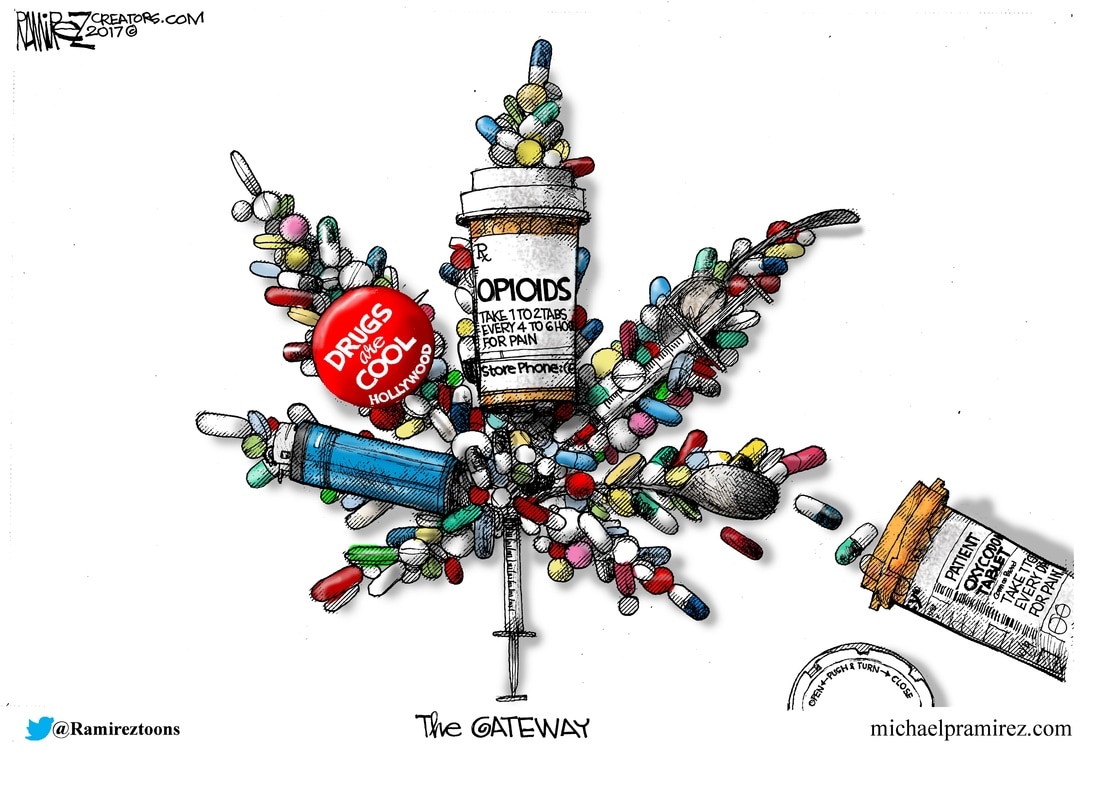Welcome to the World of Pulitzer Prize Winning Political Cartoonist Michael P. Ramirez
The Gateway 05-10-17
|
May is National Military Appreciation Month. Michael has been visiting soldiers in undisclosed locations this week as part of his work with the USO, but he left us with some beautiful signed prints, limited to just 100. When these are gone, they will only be available if you can find someone who wants to sell. A perfect gift for the soldier in your life, or anyone who loves our men and women of the military. Check out all the events planned for National Military Appreciation Month HERE
|
Sorry 4/20 Smokers: Legalizing Weed Is a Dangerous Idea
Hans von Spakovsky · Apr. 22, 2017 THE PATRIOT POST, republished from THE HERITAGE FOUNDATION
Those pushing for legalization of marijuana constantly push the notion that it is no different than alcohol. But extensive medical studies and the experience of nearly every human culture shows that isn’t true — legalizing marijuana is a dangerous idea.
Alcohol can certainly be abused, but for most people, it is not addictive and is not consumed to the point of intoxication, while low-level consumption has several positive health benefits. In fact, dozens of peer-reviewed medical studies suggest that moderate amounts reduce the risk of heart disease, strokes, gallstones, diabetes, and death from a heart attack.
Marijuana, on the other hand, is far more likely to cause addiction, is usually consumed to the point of intoxication, has no known general healthful properties (although it may have some palliative effects), and it is toxic and deleterious to health. Compared to alcohol, marijuana is not safe. Studies including from the National Institutes of Health have shown that long-term marijuana use impairs the immune system, causes short-term memory loss, and has toxic properties that can result in birth defects, pain, respiratory systems damage, brain damage, and stroke.
It may cause cognitive degradation, and is associated with lower test scores and lower educational attainment. It is particularly damaging to the brain development of young people. And unlike alcohol, which is broken down relatively quickly in the human body, THC, the main active chemical in marijuana, stays in the body for days and even weeks after its consumption.
Equating marijuana use with alcohol consumption is uninformed and misleading. They differ in every way that counts: addictiveness, toxicity, health effects, and the risk of intoxication. All that legalization does is increase demand for the drug and cause a wide variety of unintended but predictable consequences, including more crime, not less.
Marijuana trafficking is linked to crimes ranging from assault and murder to money laundering and smuggling. A study of marijuana legalization in Colorado shows big increases in marijuana-related traffic deaths, hospital visits, school suspensions, lab explosions, and pet poisonings. The number of children alone aged zero to five exposed to marijuana increased significantly to triple the national average.
Unlike marijuana, alcohol is also not a gateway drug. One of the greatest harms of marijuana legalization is increased addiction to and use of harder drugs. Prosecutors, judges, police officers and others involved in the criminal justice system know that the vast majority of defendants arrested for violent crimes test positive for illegal drugs, including marijuana. And they know marijuana is the starter drug for most criminals. Contrast that with the millions of Americans who consume moderate amounts of alcohol without ever “moving on” to heroin, cocaine, and other dangerous drugs.
Marijuana should not be legalized and those who are constantly pushing this notion seem to be lost in a haze of confusion over its effects and its dangers. All legalization will do is worsen the drug problems we already have.
Republished from The Heritage Foundation.
Hans von Spakovsky · Apr. 22, 2017 THE PATRIOT POST, republished from THE HERITAGE FOUNDATION
Those pushing for legalization of marijuana constantly push the notion that it is no different than alcohol. But extensive medical studies and the experience of nearly every human culture shows that isn’t true — legalizing marijuana is a dangerous idea.
Alcohol can certainly be abused, but for most people, it is not addictive and is not consumed to the point of intoxication, while low-level consumption has several positive health benefits. In fact, dozens of peer-reviewed medical studies suggest that moderate amounts reduce the risk of heart disease, strokes, gallstones, diabetes, and death from a heart attack.
Marijuana, on the other hand, is far more likely to cause addiction, is usually consumed to the point of intoxication, has no known general healthful properties (although it may have some palliative effects), and it is toxic and deleterious to health. Compared to alcohol, marijuana is not safe. Studies including from the National Institutes of Health have shown that long-term marijuana use impairs the immune system, causes short-term memory loss, and has toxic properties that can result in birth defects, pain, respiratory systems damage, brain damage, and stroke.
It may cause cognitive degradation, and is associated with lower test scores and lower educational attainment. It is particularly damaging to the brain development of young people. And unlike alcohol, which is broken down relatively quickly in the human body, THC, the main active chemical in marijuana, stays in the body for days and even weeks after its consumption.
Equating marijuana use with alcohol consumption is uninformed and misleading. They differ in every way that counts: addictiveness, toxicity, health effects, and the risk of intoxication. All that legalization does is increase demand for the drug and cause a wide variety of unintended but predictable consequences, including more crime, not less.
Marijuana trafficking is linked to crimes ranging from assault and murder to money laundering and smuggling. A study of marijuana legalization in Colorado shows big increases in marijuana-related traffic deaths, hospital visits, school suspensions, lab explosions, and pet poisonings. The number of children alone aged zero to five exposed to marijuana increased significantly to triple the national average.
Unlike marijuana, alcohol is also not a gateway drug. One of the greatest harms of marijuana legalization is increased addiction to and use of harder drugs. Prosecutors, judges, police officers and others involved in the criminal justice system know that the vast majority of defendants arrested for violent crimes test positive for illegal drugs, including marijuana. And they know marijuana is the starter drug for most criminals. Contrast that with the millions of Americans who consume moderate amounts of alcohol without ever “moving on” to heroin, cocaine, and other dangerous drugs.
Marijuana should not be legalized and those who are constantly pushing this notion seem to be lost in a haze of confusion over its effects and its dangers. All legalization will do is worsen the drug problems we already have.
Republished from The Heritage Foundation.


